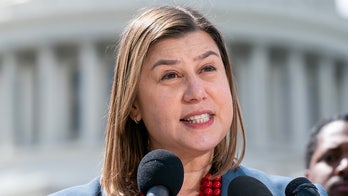
The Obama administration is banking on "green jobs" as a new growth industry, claiming it will drag the economy out of recession, create millions of new jobs -- and, have the bonus effect of helping the environment.
But disagreements over the benefits of forcing green technologies -- and the cost of creating green jobs -- have some questioning whether the United States can afford the investment in such a steep down cycle. And the European model suggests it may not work out the way it is intended.
President Obama's proposal to create 5 million green jobs over 10 years "is a political smokescreen designed to disguise the fact that his energy and environmental policies are going to be very costly," Max Schulz of the Manhattan Institute, a conservative think tank, told FOXNews.com.
"The reality is these various policies are going to hurt the economy, cost jobs in efficient industries and raise prices," Schulz said.
At the inaugural meeting of the White House Middle Class Task Force on Friday, Vice President Biden defined green jobs as "all those jobs associated with environmental improvement and improving the lives of the American people."
"Scientists working on an advanced, renewable alternative to CO2-producing fossil fuels is engaged in a green job, as is a laborer winterizing or weatherizing a home, or a lineman or a linewoman building out the smart grid -- they're all green jobs," the vice president elaborated.
The White House's 31-page report on green jobs that went along with the Biden meeting is full of positive projections for the economy based on green jobs, but does not contain details about short-term costs or potential setbacks.
"The solar industry talked to us and said we don't have any trained solar panel installers to do the job," Marchant Wentworth of the Union for Concerned Scientists told FOXNews.com. The UCS is among the groups that pushed the White House to include green jobs training in its $787 billion stimulus package signed last month.
Wentworth said funding for new jobs training won't go toward creating new and untested programs out of whole cloth but will be spent on tested environmental programs.
"What we wanted to do in the stimulus was use existing programs ... these are not new programs that we invented to do this. Take the weatherization of low-income housing. It's not a new concept but the level of funding wasn't there."
Still, pessimism about the zeal with which politicians talk up green jobs is rooted in concerns raised across the pond.
Europe, which alongside Japan has led the world in alternative energy usage, is finding the dirty jobs/green jobs swap is not such a boon. Most EU member nations aren't close to meeting Kyoto Protocol and other emissions targets, and all are finding the effort to meet them costly in terms of both euros and jobs.
In December, more than 10,000 steelworkers gathered in Brussels to protest the EU's plan to auction off CO2 emissions -- similar to Obama's cap and trade proposal -- arguing that EU producers would face "increasing competition from producers who do not meet European norms and are not subject to emissions restrictions," Agence France-Presse reported. That's similar to the argument put forth by American opponents of the Kyoto Protocol.
Europe 's hunger for alternative energy sources dates back to the boom times, when it was easier to invest and innovate ahead of proven profitability.
Now, the worldwide economic collapse has Europeans rethinking green policies. Some EU member nations are asking to stall climate change measures -- which policymakers sell on the promise of a long-term payoff over short-term pain -- until their balance sheets are healthier.
Late last year, Italy threatened to veto an emissions measure that it said would disproportionately depress its large manufacturing sector, and developing members like Poland argued that coal emissions caps would swell their already burgeoning unemployment rolls.
"It's one thing to say that we're going to create all these jobs in wind and solar energy -- and it's possible we will create those jobs," said Schulz an Energy Department official under President George W. Bush.
"But if you listen to what Obama says, he wants to 'transform' our energy economy and get it off coal and oil. [Those industries] employ millions of people and are efficient. Wind and solar energy... are costly and inefficient and not competitive. That's the reason that they don't have much of a foothold in our energy economy."
Obama has cautioned that the transition to an alternative energy economy will not be seamless, and some economists warn that government plays a dangerous game with tax dollars by trying to sculpt a market instead of allowing environmental supply-and-demand to develop naturally.
And energy experts like Schulz question the wisdom of pouring billions into the transition amidst a deep recession. They say imposing harsher caps could lead to a short-term spike in energy prices -- something many Americans can ill afford these days.
For example, California , a leader in this nation's environmental policies, has a 10.1 percent unemployment rate and is teetering on bankruptcy. But California 's Legislature approved a new emissions law last week despite an independent panel of economists' finding that "the net dollar cost of each of these regulations is likely to be much larger than what is reported."
The Sacramento Bee, a reliable cheerleader for green policies, warned that the emissions law doesn't do enough to address the "real costs of the transition."
"Energy prices will rise, and major capital investment will be needed in public transit, energy-efficient buildings and new transmission lines. Industries that are energy-intensive will move elsewhere," the newspaper's editorial board noted.
Still, pioneers in green technologies continue to pop up and flourish across the country. Companies like Suzlon Wind Energy in Chicago and Veslas, a wind turbine manufacturer in Colorado , expect to add jobs this year, though even proponents accede that the pace of job growth in those sectors will barely make an impact on the economy in the near term.
Few dispute that green industries that diminish U.S. dependence on foreign oil -- and the re-training of blue-collar workers to usher in the new era -- should be a government priority. But if one thing can be learned from the examples in Europe and California , it is that the Obama administration might want to make sure to be absolutely clear on the costs of going green.




